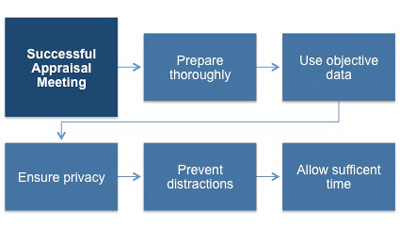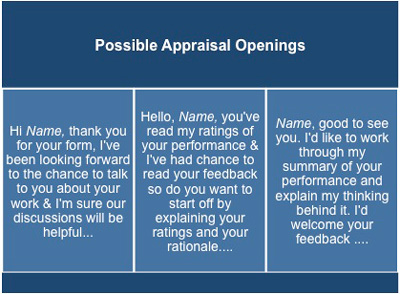Appraisal Meeting Structure
This two-way interaction between the manager and the employee is essential for maintaining a positive working relationship and encouraging career development. An essential feature of the appraisal is that the employee should feel as though their own opinions have been considered and that the completed appraisal form represents a fair, agreed, and unbiased view of their performance for the period.
 |
Sound preparation is an essential aspect of your appraisals and can only be achieved if you follow the OSCAR principles as detailed in the 'Performance Management Principles' eBook, which can be downloaded from this website. Remember, this preparation represents an ongoing process throughout the appraisal period; it is not something that can be done in just a few hours before the meeting.
You should do everything you can to avoid postponing or rescheduling the meeting because something 'more important' comes up. It may be more important to you, but it is unlikely that your team member will see it that way. Postponing an appraisal meeting should only be done when it is absolutely unavoidable. Postponing it twice could damage your relationship with your team member irrevocably.
You should also allow sufficient time to discuss and agree new goals and competencies since these are often a natural progression of the goals you've just been reviewing. You do not want to hurry through the final points due to poor timekeeping, as you risk appearing rude and disrespectful, which could undo all the rapport-building and respect you had acquired. To avoid this ensure that you allow 90 minutes for each appraisal, which should be ample time provided that you have prepared properly.
Holding your appraisal meetings in the afternoons allows you to deal with your daily workload and then focus completely on the meeting. You must avoid any disruptions during your meetings, as this would show a lack of respect for the team member. These interruptions also negate any privacy you hope to have for the meeting and create a tense rather than comfortable atmosphere.
Remember that first impressions are key and will set the tone of the whole meeting, so you must make sure your opening statement creates the desired atmosphere.
As with all your meetings state the timings you wish to adhere to from the start so that everything can be covered to both attendees' satisfaction. The team member's response to your performance summary should provide you with a good indication of any areas that are contentious and therefore likely to take the most time to resolve.
The first thing you need to do is to put the team member at ease and reassure them that you want open and honest discussion of their performance to take place. Your opening remarks set the expectation for the meeting in terms of the degree of formality and sequence of topics. Each example of a possible opening given below clearly indicates to the employee that you see the appraisal as an inclusive process and expect their full participation. The words you say must portray a willingness to have a frank and open discussion. They also illustrate that whilst you act on behalf of the organization you are responsible for their final rating.
 |
By referring to the appraisal form in your opening you indicate that the structure of the discussion will follow its layout. Avoid wide-ranging and general questions such as, 'So, how do you think things have been going this past year?' as this can quickly take the conversation into areas that the team member has strong feelings about and result in an unstructured general discussion.
Throughout the meeting it is important that you demonstrate your genuine interest in their point of view through the questions you ask and how you seek out relevant facts. Making notes and maintaining a reasonable amount of eye contact demonstrate that their opinions matter to you.
This Preparing for Appraisal Meeting Checklist outlines eight basic steps you need to complete so that you are properly prepared for your team's appraisal meetings, and this Appraisal Meeting Checklist outlines the steps you need to take to conduct a successful appraisal meeting with a team member.
You may also be interested in:
Appraisal Meeting Tips | Appraisal Forms Format | Past Performance Evaluation | Appraisal Goals and Objectives | Appraisal Discussion Points.



